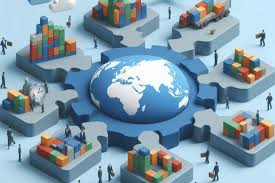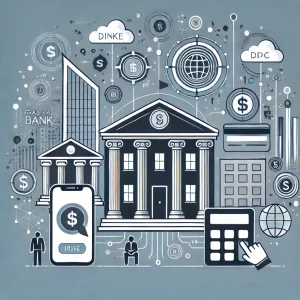The Power of Blockchain for Supply Chain Management

The global supply chain is a complex, interconnected web that facilitates the movement of goods and services across borders and industries. However, traditional supply chain systems are often plagued by inefficiencies, lack of transparency, and vulnerabilities to fraud. Blockchain technology has emerged as a transformative force capable of addressing these challenges by introducing transparency, traceability, and security to supply chain management.
This article explores the transformative power of blockchain in supply chain management, its benefits, real-world applications, and the challenges associated with its implementation.
Understanding Blockchain in Supply Chain Management
Blockchain is a distributed ledger technology that records transactions in a decentralized, immutable, and transparent manner. Each transaction is verified and added to a chain of blocks, ensuring a secure and tamper-proof record of data. In the context of supply chain management, blockchain offers a digital infrastructure for recording every step of a product’s journey, from raw material sourcing to delivery to the end consumer.
Key Benefits of Blockchain in Supply Chain Management
1. Enhanced Transparency and Traceability
Blockchain allows all participants in the supply chain—manufacturers, suppliers, distributors, retailers, and consumers—to access a shared, single version of the truth. Every transaction is recorded in real-time, providing complete visibility into the movement of goods.
- Traceability: Blockchain enables the tracking of products at every stage of the supply chain. This is crucial for industries like food and pharmaceuticals, where origin and quality assurance are critical.
- Proof of Authenticity: Blockchain can verify the authenticity of products, combating counterfeiting and fraud.
2. Improved Efficiency
By automating processes and reducing reliance on intermediaries, blockchain streamlines supply chain operations. Smart contracts—self-executing contracts with terms directly written into code—can trigger payments, orders, or deliveries once predefined conditions are met.
3. Strengthened Security
Blockchain’s decentralized and cryptographic nature makes it highly secure. Data on the blockchain is immutable, meaning it cannot be altered or deleted, reducing the risk of tampering, fraud, or cyberattacks.
4. Reduced Costs
By eliminating intermediaries and increasing operational efficiency, blockchain reduces administrative costs. Automated processes, such as payment settlements and inventory management, save time and resources.
5. Sustainability and Ethical Sourcing
Blockchain enables businesses to verify the ethical and environmental impact of their supply chains. For instance, companies can use blockchain to prove that raw materials are sourced sustainably and that labor practices adhere to ethical standards.
Real-World Applications of Blockchain in Supply Chain Management
1. Food Safety
Blockchain enhances food supply chain transparency by tracking the journey of food products from farm to table. This allows for swift identification of contamination sources during food safety incidents.
- Example: Walmart partnered with IBM to implement a blockchain-based system for tracking fresh produce. The system reduced the time to trace food origins from days to seconds, ensuring rapid response to food safety concerns.
2. Pharmaceutical Supply Chains
Counterfeit drugs pose significant risks to public health. Blockchain ensures the authenticity of pharmaceuticals by providing a verifiable record of their production and distribution.
- Example: Pfizer and Merck are part of the MediLedger Project, which uses blockchain to combat counterfeit drugs and improve traceability in pharmaceutical supply chains.
3. Luxury Goods
Blockchain helps verify the authenticity of high-value items like diamonds, artwork, and designer goods, reducing fraud and ensuring provenance.
- Example: De Beers developed Tracr, a blockchain platform to track diamonds from the mine to the retailer, ensuring their authenticity and ethical sourcing.
4. Automotive Industry
Blockchain improves the tracking of auto parts and ensures compliance with regulatory standards. It also facilitates secure data sharing among manufacturers, suppliers, and service providers.
- Example: BMW uses blockchain to trace the origin of raw materials, ensuring ethical sourcing and reducing the risk of conflict minerals entering their supply chain.
5. Logistics and Freight Management
Blockchain optimizes logistics by automating processes like customs clearance, reducing paperwork, and ensuring accurate tracking of shipments.
- Example: Maersk and IBM developed TradeLens, a blockchain-based platform for tracking shipping containers. TradeLens enhances transparency and reduces inefficiencies in global trade.
How Blockchain Works in Supply Chain Management
1. Data Recording
Every transaction or event in the supply chain is recorded on the blockchain. This could include manufacturing details, shipment dates, storage conditions, and delivery timelines.
2. Verification
Transactions are verified by a network of participants before being added to the blockchain. This ensures that the data is accurate and tamper-proof.
3. Smart Contracts
Smart contracts automate actions such as payments, inventory updates, or notifications when predefined conditions are met. For example, a smart contract can release payment to a supplier once a shipment is delivered.
4. Immutable Records
Once data is added to the blockchain, it cannot be altered or deleted. This ensures a reliable and permanent record of all supply chain activities.
Challenges of Implementing Blockchain in Supply Chain Management
1. High Implementation Costs
Developing and deploying blockchain systems can be expensive, particularly for small and medium-sized enterprises. Infrastructure, integration, and training costs can be significant barriers.
2. Scalability Issues
Blockchain networks can face scalability challenges, particularly when handling large volumes of transactions. Ensuring fast and efficient processing at scale remains a technical hurdle.
3. Interoperability
Supply chains often involve multiple systems and technologies. Integrating blockchain with existing systems and ensuring compatibility among participants can be complex.
4. Regulatory and Legal Uncertainty
The regulatory landscape for blockchain is still evolving. Companies may face legal uncertainties, particularly when operating across multiple jurisdictions.
5. Data Privacy
While blockchain offers transparency, some participants may have concerns about sharing sensitive data. Balancing transparency with privacy is a critical challenge.
The Future of Blockchain in Supply Chain Management
The potential of blockchain for supply chain management is vast, and its adoption is expected to grow significantly in the coming years. Key trends shaping the future include:
1. Integration with IoT and AI
Combining blockchain with Internet of Things (IoT) devices and artificial intelligence (AI) will enhance supply chain automation, data collection, and decision-making. IoT sensors can record real-time data, such as temperature or location, onto the blockchain, while AI can analyze this data for predictive insights.
2. Greater Standardization
Industry-wide standards for blockchain implementation will facilitate interoperability and encourage widespread adoption.
3. Increased Focus on Sustainability
As consumers demand more sustainable and ethical practices, blockchain will play a crucial role in verifying and showcasing these efforts.
4. Broader Industry Adoption
While early adopters have been industries like food, pharmaceuticals, and logistics, other sectors such as energy, fashion, and electronics are likely to embrace blockchain for supply chain management.
Conclusion
Blockchain technology is revolutionizing supply chain management by introducing unprecedented levels of transparency, traceability, and efficiency. By addressing longstanding challenges like fraud, inefficiency, and lack of accountability, blockchain empowers businesses to build more resilient, secure, and customer-centric supply chains.
Despite the challenges associated with implementation, the benefits of blockchain far outweigh the drawbacks. As the technology matures and adoption grows, blockchain is set to redefine the future of supply chain management, creating a more transparent and sustainable global trade ecosystem. Businesses that embrace this transformative technology will be well-positioned to thrive in an increasingly competitive marketplace.






